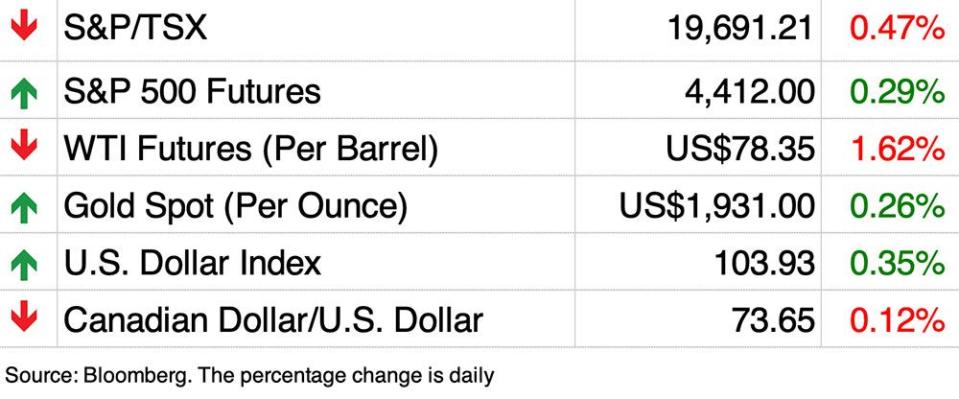Posthaste: How detached home prices sparked a rally in some of Canada's major housing markets this year


Detached home prices fell early this year, but an influx of buyers looking to take advantage of cooling valuations ultimately pushed prices back up in some of Canada’s hottest housing markets, though not to year-ago levels, a new report from Re/Max Canada says.
The Toronto, Vancouver and Fraser Valley, B.C., markets all saw a surge in homebuying activity as prices of detached homes fell substantially in the first quarter of the year, Re/Max said in its report. That renewed demand, combined with a shortage of listings, ending up putting upward pressure on prices in the second quarter.
The flurry of activity wasn’t enough to reverse price declines completely, however. Re/Max said valuations of almost 93 per cent of detached homes in Toronto, Vancouver and Fraser Valley fell in the first half of the year, compared to the same time in 2022.
But losses were only in the single digits in 43 per cent of the 82 neighbourhood markets Re/Max surveyed. And some did experience gains. For example, prices of detached homes in a number of central Toronto neighbourhoods were up 16 per cent. In the Greater Vancouver Area, prices in the Gulf Islands climbed 13 per cent.
“Anxious homebuyers were quick to identify the bottom of the market and jumped in with both feet in the second quarter of the year,” Christopher Alexander, president of Ra/Max Canada, said. “The short burst of homebuying activity clearly underscored the resilience of the housing market.”
Buyers on the hunt for affordability set their sights on more reasonably priced detached homes under $2 million in the second quarter, Alexander said. That pushed sales to more than double between the first and second quarter in Toronto, Vancouver and Fraser Valley.
Price-conscious homebuyers in a high-interest rate environment also put more emphasis on value-added features, such as basement apartments that can be rented out to help fund mortgage payments, and less on location as seen in previous bouts of activity.
“Location has been replaced by value and necessity,” Elton Ash, executive vice president of Re/Max Canada, said in the report. “A growing number of buyers are willing to travel further afield to get the best bang for their buck.”
That trend may help explain why prices in the Gulf Islands in the Greater Vancouver Area rose so much. The region, accessible by ferry, has become attractive to remote workers seeking more space at more reasonable prices than can be found in Vancouver.
Still, a lack of supply kept a lid on sales in the markets overall and transactions of detached homes were down compared to the same time last year, Re/Max said.
An interest rate hike from the Bank of Canada in June also helped spoil the party.
Last year, home prices fell after housing market activity cooled in the face of a long string of interest rate increases. A pause in March and April helped reignite market activity this spring. But two back-to-back hikes in June and July tempered housing market activity again. Sales were down 0.7 per cent in July from June, the Canadian Real Estate Association said on Aug. 15.
Where the housing market goes next will depend on the Bank of Canada’s next move, Ash said. If the bank raises rates again, as some expect will happen in September after July inflation came in higher than expected, buyers and sellers will likely stay on the sidelines. But once inflation stabilizes and the Bank of Canada stops hiking rates, expect activity in the housing market to pick up again.
The question is when exactly that will pan out.
“We expect the tide will turn,” Ash said. “It’s only the timing that is still to be determined.”
_____________________________________________________________
Was this newsletter forwarded to you? Sign up here to get it delivered to your inbox.
_____________________________________________________________

People in the United States are increasingly looking to retire early, which could spell bad news for employers already smarting from labour shortages.
The likelihood of the average person working past the age of 62 fell 47.7 per cent in July from 48.8 per cent from the same month last year, according to a Federal Reserve Bank of New York survey released Aug. 21. That’s the lowest reading since the Fed started keeping track in March 2014. The number has been falling since the start of the COVID-19 pandemic.
“Those data could suggest that older people see the labour market as unappealing, or that the pandemic made more of them think about retirement,” reports Bloomberg.
___________________________________________________
Today is the last day of a three-day retreat for Prime Minister Justin Trudeau’s cabinet in Charlottetown. The focus is on the economy and affordability issues.
Ontario’s Divisional Court will release its decision in Jordan Peterson vs. The College of Psychologists of Ontario.
Today’s data: Retail sales; U.S. new home sales
Earnings: Nvidia Corp., Peloton Interactive Inc.
___________________________________________________

_______________________________________________________
Peter Hall: Why the Bank of Canada should ignore the July inflation spike
Canadian banks seen delivering upside surprise amid low expectations
The boss was right: Working from home full time really is bad for business
Home sales dip in July as interest rates weigh on housing market
Toronto home sales, prices up from last year, but momentum slows
____________________________________________________
Everyone likes a little feedback, but short-term feedback in investing is usually meaningless, says veteran investor Tom Bradley. He explores six other reasons why buying and selling stocks doesn’t resemble other facets of your life even if you think it does.
____________________________________________________
Today’s Posthaste was written by Victoria Wells (@vwells80), with additional reporting from Financial Post staff, The Canadian Press, Thomson Reuters and Bloomberg.
Have a story idea, pitch, embargoed report, or a suggestion for this newsletter? Email us at posthaste@postmedia.com.

 Yahoo Finance
Yahoo Finance 




